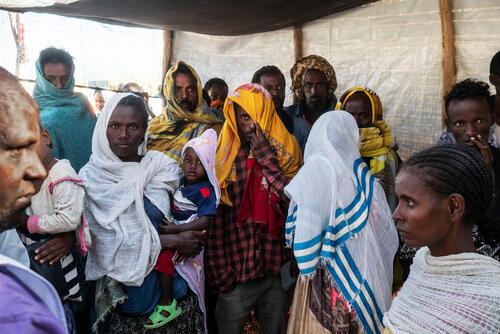Tigray crisis: How MSF is treating people in the north of Ethiopia
Hundreds of thousands of people have been now been forced to flee their homes in the Tigray region of northern Ethiopia since fighting broke out in early November 2020.
Some 50,000 people have crossed into Sudan as refugees, while many others are displaced within the Tigray region itself, staying in towns, remote areas or trapped between localised outbreaks of fighting.
MSF teams have been providing medical care to some of the affected people in Tigray since mid-December.
Escaping the violence
In areas we have reached, tens of thousands of displaced people are living in abandoned buildings and on construction sites in areas around Shire, Dansha and Humera towns, while others have found refuge in the east and south of the region. They have very limited access to food, clean water, shelter and healthcare.
We have also heard reports that many people are still hiding in the mountains and rural areas across the region.
In the places we can access, power lines are cut, water supplies don’t function, communications networks are down, banks are closed and many people are afraid to return home because of the ongoing insecurity. Most people have no way to contact their relatives or to buy essential items.
The fighting broke out at harvest time in a region where crops were already badly damaged by locusts, leaving food in short supply.
Before the violence started, nearly one million people were already dependent on humanitarian assistance. Although aid agencies and local authorities are distributing food in some areas, they are not reaching everyone.

Help us prepare for the next emergency
Medical teams across Tigray
In southern Tigray, MSF teams are running mobile clinics and have restarted some services at health centres in the towns of Hiwane and Adi Keyih, alongside staff from the Ministry of Health. Between 18 December and 3 January, we provided 1,498 medical consultations here.
In eastern Tigray, we are supporting the hospital in Adigrat, the region’s second city. When our team first arrived on 19 December, they found the hospital (which served a population of more than one million people) had partially stopped functioning. We urgently transported oxygen cylinders and food, as well as referred some patients on to Afder hospital in the regional capital.
Since 23 December, our team here has been running the hospital’s emergency department, the surgical, paediatric and maternity wards, as well as providing outpatient care for children under five. In total, we treated 760 patients in the emergency room from 24 December to 10 January.
In central Tigray, in the towns of Adwa, Axum and Shire, MSF teams are delivering basic medical aid and supporting health facilities that are missing essential supplies including medications, oxygen and food.
In total, our teams estimate that between three and four million people in central Tigray have no access to basic healthcare.
We are also responding to the needs of refugees arriving at camps across the border in Sudan.
Violence in Ethiopia has displaced hundreds of thousands of people
